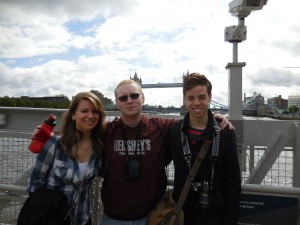Humbling.
That’s the only way to describe what we’ve encountered the past two or three days in Bayeux, which is a small, genteel town on the Norman coast not too far from where D-Day took place. Of the morning on the day that I am writing this post, we went to Utah Beach, where the Allied troops had by far the easiest landing (tomorrow we go to Omaha Beach, which was, without a doubt, the most difficult landing). Here on this beach, men landed, fought and died for the right of others, most of whom they’d never met, to live in peace and not have to fear totalitarianism or that whatever family or people they were born into would get them killed.
Standing at the beach or by the museum we would later go into, you can see memorials all over the coast, commemorating the many people who fought and died on that bloody day nearly seventy years ago. And all around the area, you see white and blue signs marking a spot where an Allied soldier was felled. When you reach the town of St. Mere-Eglise, you can go to the church and how the paratroopers who helped to liberate the town have been immortalized on the outside of the church and the stained-glass windows depicting paratroopers on either side of the Virgin Mary.
After roaming through the Musee Airborne, you finally go to the German War Cemetery, kept and maintained as a reminder of the atrocities of the war and how peace should be preserved.
One sees all this, and one can’t help but feel humbled by all that they’ve been witness too. This is the marking of history, of powerful events that still resonate in this area of France today. It’s like being hit by a shockwave from the past that flows through you and makes you aware of the gravity of the battle for the liberation of France.
Tomorrow I go to visit more beaches and cemeteries. I don’t think that feeling of humility will be diminished. In fact, I’m willing to bet money it’ll be just as awe-inspiring as Utah and everywhere else I was today, if not much more than that. And I look forward to documenting every minute of it, both in photos and in my memories (though the latter tends to be really spotty sometimes).
See you when I write again!

